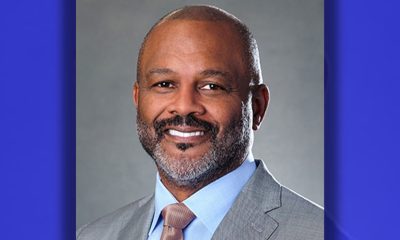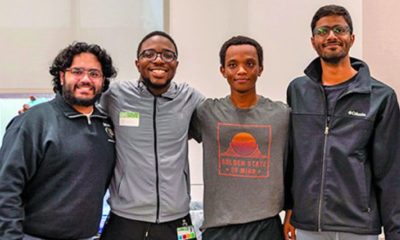City Government
Board of Supervisors OKs Lease for Shelter At 711 Post Street
“It is going to take all of us working together as a city if we want to achieve our ambitious effort to move thousands of people off the street and into shelter and permanent housing,” said Mayor London Breed. “The approval of the lease at 711 Post not only allows us to build on the progress that we have made over the past two years to add new hotels for housing and shelter, but it also provides us an opportunity to recreate a temporary shelter model that further meets the needs of all of our homeless residents.”

Site will provide temporary shelter for 200-250 people experiencing homelessness in the surrounding area, building on Mayor Breed’s Homelessness Recovery Plan
The Board of Supervisors voted Tuesday to approve Mayor London N. Breed’s proposal to open a new shelter at 711 Post St. for adults experiencing homelessness. The vote to fund the master lease and operations of the Ansonia Hotel will allow the site to be used as a semi-congregate shelter, with 123 units ranging from singles to quads able to shelter approximately 250 people.
“It is going to take all of us working together as a city if we want to achieve our ambitious effort to move thousands of people off the street and into shelter and permanent housing,” said Mayor Breed. “The approval of the lease at 711 Post not only allows us to build on the progress that we have made over the past two years to add new hotels for housing and shelter, but it also provides us an opportunity to recreate a temporary shelter model that further meets the needs of all of our homeless residents.”
The City conducted a search for properties that would allow long-term semi or non-congregate shelter options that build off the lessons learned at Shelter in Place hotels, leading to the implementation of a new type of shelter model.
The site at 711 Post offers a unique opportunity to provide shelter in a building with private and small rooms, community space, and high-quality amenities rather than a traditional congregate facility.
Other amenities include a lobby and front desk, basement, community area, commercial kitchen, dining space, laundry room, office space, security camera system, elevator, lockers and storage, and bathrooms and showers on each floor.
“Shelter is a critical and core component of our Homelessness Response System,” said Shireen McSpadden, executive director of the Department of Homelessness and Supportive Housing. “With our concentrated efforts at the Tenderloin Linkage Center, there is an increased urgency to expand our shelter capacity to people experiencing homelessness who are ready to exit the street.”
The site will have 24-hour staffing, services, and daytime case management provided by non-profit partner Urban Alchemy, who was selected due to their recent success managing Shelter in Place Hotels, Safe Sleep programs, and community ambassador programs.
The contract with Urban Alchemy will also include funding for street activation and monitoring in the surrounding area 24 hours per day, seven days per week, focusing on discouraging loitering and preventing encampment activity and disruptive behavior outside of the shelter.
“The 711 Post model is an incredible opportunity to provide a stable shelter with resources for those in need, and to ensure cleaner, safer streets in the surrounding neighborhood,” said Lena Miller, CEO of Urban Alchemy. “Urban Alchemy is committed to delivering our holistic approach — embracing our unhoused neighbors who need safe spaces and embracing the neighborhood, so the quality of life improves for everyone.”
The lease of 711 Post Street builds on Mayor Breed’s Homelessness Recovery Plan by helping the City create more shelter and housing for homeless residents as San Francisco emerges from the COVID-19 pandemic. Through Mayor Breed’s plan, the City will expand capacity in the Homelessness Response System and aims to make 6,000 placements available for people experiencing homelessness by expanding the City’s housing options.
Progress on Mayor Breed’s Homelessness Recovery Plan can be found here: sf.gov/data/homelessness-recovery-plan
The San Francisco Mayor’s Office of Communication provided this report.
City Government
LAO Releases Report on Racial and Ethnic Disparities in California Child Welfare System
Racial inequalities in California’s child welfare system disproportionately impact poor Black and Native American children, according to a report released April 3 by the nonpartisan Legislative Analyst’s Office (LAO). The report, which was presented to the Assembly Subcommittee No. 2 on Human Services — chaired by Assemblymember Corey Jackson (D-Moreno Valley) — states that the proportion of low-income Black and Native American children in foster care is four times larger than other racial and ethnic groups in the state.

Racial inequalities in California’s child welfare system disproportionately impact poor Black and Native American children, according to a report released April 3 by the nonpartisan Legislative Analyst’s Office (LAO).
The report, which was presented to the Assembly Subcommittee No. 2 on Human Services — chaired by Assemblymember Corey Jackson (D-Moreno Valley) — states that the proportion of low-income Black and Native American children in foster care is four times larger than other racial and ethnic groups in the state. Half of the children from each racial group has experienced some level of child welfare involvement before reaching legal age.
Jackson is a member of the California Legislative Black Caucus.
“Racial and ethnic disproportionality and disparities are present within initial allegations and persist at all levels of the system — becoming the most pronounced for youth in care,” the report states.
The disparities have persisted over the last decade across the state, the LAO found, adding that Black children living in poverty are more likely to enter foster care. State data shows that there is a correlation between poverty and foster placement in each county.
“Throughout all levels of the child welfare system, families experiencing poverty are more likely to come to the attention of and be impacted by the child welfare system,” stated the report.
Overall, the report revealed that more than half of the families affected by the state child welfare system earn $1,000 per month, significantly less than the national average of $5,000 a month.
The financial disparities highlighted in the LAO report align with existing research indicating that poverty is among the main factors contributing to the likelihood of child maltreatment. State anti-poverty programs include cash aid, childcare subsidies, supportive housing, and nutrition assistance.
California Black Media
Commentary: Finding the Right Balance — Addressing Organized Retail Theft While Upholding Civil Liberties
Organized retail theft is a significant issue that impacts both consumers and businesses. While it is crucial to address theft and protect businesses from losses, we should also be mindful of safeguarding individuals’ constitutional rights, particularly the right to due process. AB 1990 by Assemblymember Wendy Carrillo, also known as the STOP Act, raises concerns about the balance between addressing theft effectively and ensuring civil liberties are upheld.

By Assemblymember Tina McKinnor | Special to California Black Media Partners
Organized retail theft is a significant issue that impacts both consumers and businesses. While it is crucial to address theft and protect businesses from losses, we should also be mindful of safeguarding individuals’ constitutional rights, particularly the right to due process.
AB 1990 by Assemblymember Wendy Carrillo, also known as the STOP Act, raises concerns about the balance between addressing theft effectively and ensuring civil liberties are upheld. This bill allows law enforcement officers to make warrantless arrests for shoplifting offenses not witnessed by the officer, as long as there is reasonable cause to believe the individual committed the crime. This bill has a dangerous potential for overreach and infringes on civil liberties, particularly the right to due process.
While the stated intention behind the STOP Act is to combat organized retail theft and protect businesses, there are valid concerns that this bill is an overreach and that existing law works, if properly enforced by our partners in law enforcement. A petty theft involving property stolen valued at $950 or less may be charged as a felony or misdemeanor (called a wobbler) if the offender has the following prior convictions: 1) at least on prior petty or theft-related conviction for which a term of imprisonment was served, and 2) a prior conviction for a serious or violent offense, for any registerable sex offense, or for embezzlement from a dependent adult or anyone over the age of 65. A misdemeanor can result in a sentence of up to one year in jail, whereas a felon can mean incarceration for 16 months, two years or three years. Let’s look at shoplifting in California. It occurs when a suspect enters a store, while that establishment is open, intending to steal property worth less than $950. The crime is considered a misdemeanor, punishable by up to six months in the county jail.
Granting officers the authority to arrest individuals based on reasonable cause, without witnessing the crime firsthand, can lead to negative consequences and possible violations of individual rights. Probable cause is the legal standard by which police authorities have reason to obtain a warrant for the arrest of a suspected criminal and for the courts to issue a search warrant. A grand jury uses the probable cause standard to determine whether or not to issue a criminal indictment. The principle behind the probable cause standard is to limit the power of authorities to conduct unlawful search and seizure of a person or its property, and to promote formal, forensic procedures for gathering lawful evidence for the prosecution of the arrested criminal. Reasonable cause does not require any of this due process and only requires that an officer reasonably believes that a crime has been committed. It is essential to find a middle ground that effectively addresses organized retail theft without compromising the fundamental rights of individuals.
California’s current laws, including the use of witness statements and surveillance evidence are sufficient for addressing suspected shoplifting and organized retail theft. California Attorney General Rob Bonta recently prosecuted Michelle Mack, a suspected organized smash and grab ringleader who paid twelve women to travel around California and commit over $8 million in retail theft at 21 different stores. AG Bonta used California’s current laws to have the suspect arrested and brought to justice.
The State of California is also making significant investments to address retail theft. Just this past year California invested an additional $267 million to combat organized retail theft. It has been less than a year and our law enforcement partners should have the opportunity to address this recent spike in retail theft crime.
Los Angeles County recently applied for and received a grant for the State of California for $15.6 million dollars to address retail theft enforcement. LA District Attorney George Gascon also recently formed an organized retail task force that partners with LA County Sheriff’s Department, Glendale, Beverly Hills, Burbank, Torrance and Santa Monica Police Departments to integrate their response to retail theft across the region. These collaborative efforts, such as those seen in initiatives like the organized retail task force in LA County, demonstrate the importance of a united approach to tackling theft while maintaining a balance between enforcement and civil liberties.
As we move forward, it is essential for policymakers, law enforcement agencies, businesses and communities to work together in finding solutions that effectively address organized retail theft without encroaching on individual rights. Ongoing evaluation and a commitment to thoughtful consideration will be crucial in navigating this challenge and fostering a safe and prosperous environment for all. Balancing the scales of justice to protect businesses while upholding civil liberties demands a comprehensive and conscientious approach from all stakeholders involved.
I am confident we can find that balance.
About the Author
Assemblymember Tina McKinnor (D-Inglewood) represents the 61st District in Los Angeles County, which includes parts of the South Bay, Inglewood, Hawthorne and Lawndale.
Activism
Oakland Post: Week of April 10 – 16, 2024
The printed Weekly Edition of the Oakland Post: Week of April 10 – 16, 2024

To enlarge your view of this issue, use the slider, magnifying glass icon or full page icon in the lower right corner of the browser window. ![]()
-

 Activism4 weeks ago
Activism4 weeks agoOakland Post: Week of March 20 – 26, 2024
-

 #NNPA BlackPress3 weeks ago
#NNPA BlackPress3 weeks agoCOMMENTARY: D.C. Crime Bill Fails to Address Root Causes of Violence and Incarceration
-

 #NNPA BlackPress3 weeks ago
#NNPA BlackPress3 weeks agoMayor, City Council President React to May 31 Closing of Birmingham-Southern College
-

 #NNPA BlackPress3 weeks ago
#NNPA BlackPress3 weeks agoFrom Raids to Revelations: The Dark Turn in Sean ‘Diddy’ Combs’ Saga
-

 #NNPA BlackPress3 weeks ago
#NNPA BlackPress3 weeks agoCOMMENTARY: Lady Day and The Lights!
-

 #NNPA BlackPress3 weeks ago
#NNPA BlackPress3 weeks agoBaltimore Key Bridge Catastrophe: A City’s Heartbreak and a Nation’s Alarm
-

 #NNPA BlackPress3 weeks ago
#NNPA BlackPress3 weeks agoBaltimore’s Key Bridge Struck by Ship, Collapses into Water
-

 Activism3 weeks ago
Activism3 weeks agoOakland Post: Week of March 27 – April 2, 2024
















































